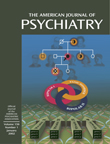Relationship of Maternal Smoking During Pregnancy With Criminal Arrest and Hospitalization for Substance Abuse in Male and Female Adult Offspring
Abstract
OBJECTIVE: Maternal prenatal smoking has been found to be related to externalizing behavior problems in male offspring, but this relationship has rarely been examined in female offspring. Preliminary evidence suggests that maternal prenatal smoking may be particularly related to antisocial behavior outcomes in male offspring and substance abuse problems in female offspring. This study attempted to replicate these findings in a large-scale, longitudinal community cohort study. METHOD: Subjects were a birth cohort of 4,169 male and 3,943 female offspring born between 1959 and 1961 in Copenhagen, Denmark. During the third trimester of pregnancy, the subjects’ mothers self-reported the number of cigarettes smoked on a daily basis. When the offspring were adults, their criminal arrest histories and psychiatric hospitalizations for substance abuse were checked in national registers. Additional data were collected concerning maternal rejection of the infant, socioeconomic status, maternal age, pregnancy and delivery complications, use of drugs in pregnancy, paternal criminal history, and parental psychiatric hospitalization. RESULTS: Results indicate a dose-response relationship between the amount of maternal prenatal smoking and both criminal arrest and psychiatric hospitalization for substance abuse in male and female offspring. These relationships remained significant after potential demographic, parental, and perinatal risk confounds were controlled. Hospitalization of offspring for substance abuse mediated the relationship between maternal prenatal smoking and criminal arrest for female but not for male offspring. CONCLUSIONS: Maternal prenatal smoking is related to criminal and substance abuse outcomes in male and female offspring. Higher rates of index arrests for female offspring may be related to their substance abuse problems.



